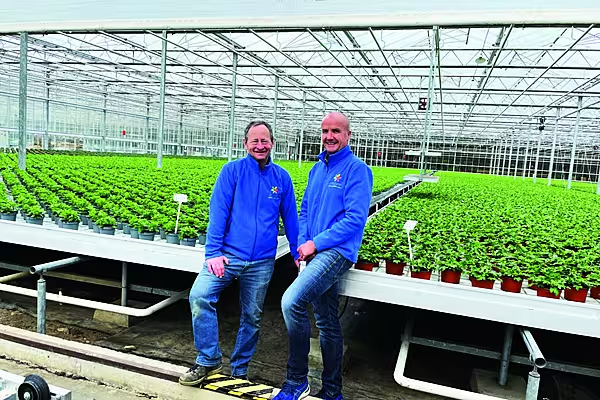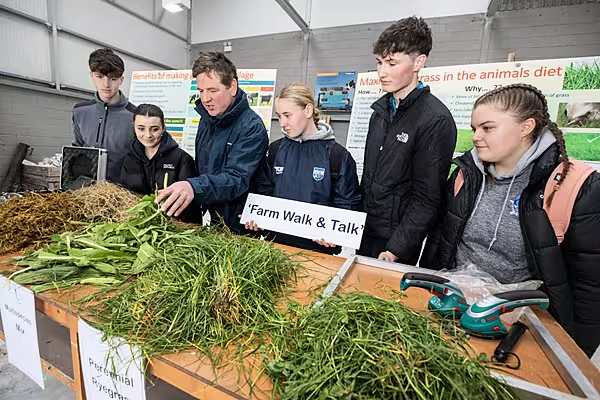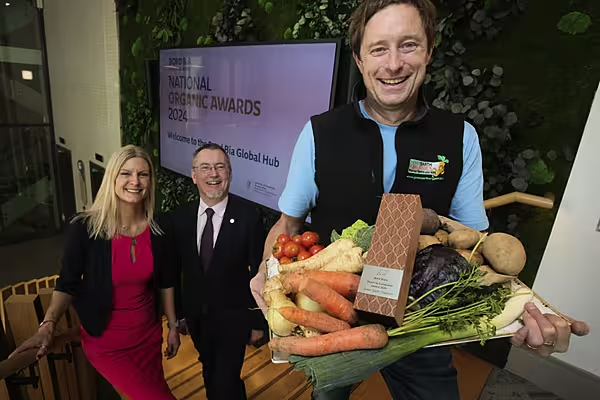Uniplumo, one of Ireland’s largest specialist wholesale growers of ornamental plants, unveiled a €5 million fully automated glasshouse expansion project at its Wyestown, Co Dublin site in January 2023. Maev Martin talks to managing director Tom Summerville about the attendant growth opportunities for the business.
The Uniplumo business began in a 5,000 square metre glasshouse in Co Kerry, where young plants were grown and exported in the 1960s.
After emerging from receivership in the 1970s, the business was acquired by Fruit Importers Ireland (F.I.I.), now Dole Ireland, and it relocated to Swords, Co Dublin in the 1980s.
This was followed by a period of growth and expansion at the Swords site throughout the 1990s and 2000s, before the company acquired its modern ‘forever home’ in Wyestown, Co Dublin, in 2017.
The expansion at Wyestown, which took place between March and December last year, has resulted in the creation of 10,000 square metres of additional glasshouse production capacity at the site.
The expansion to the glasshouse complex and associated site upgrade works incorporated an additional 750,000-litre roof water harvesting and storage reservoir, adding to the existing 1.25 million litre roof water storage reservoir.
“Water is a precious resource and holding increased storage capacity on site is a critical operational resource, as well as an environmentally friendly use and reuse of water,” he says.
Uniplumo began 2023 with the acquisition of a third site in Co Meath, and a further significant investment in a 1.5MW biomass heating system for the site is about to commence.
When fully commissioned and operational in autumn 2023, it will provide 100% of the heat demand for the site and will be fuelled by over 2,000 tonnes of locally grown, and sustainably sourced, woodchip fuel.
Uniplumo grow and produce over seven million plants annually from their 72,000 square metres of glasshouses at three nursery sites in Fingal, Co Dublin and Co Meath.
The business also operates Easygarden, an urban garden centre in Templeogue in Dublin.
Grocery Retail Growth
Uniplumo began supplying its plants and flowers to the grocery retail sector in the mid-1970s.
Today, the company supplies its plants to Tesco, Musgrave (SuperValu and Centra), Dunnes Stores, Aldi and Lidl.
“Quinnsworth and Roches Stores were our first supermarket customers and the Quinnsworth supply relationship developed further when Tesco acquired it in 1997,” he says.
“We have long standing supply partnerships with several retailers, and these continue to thrive today.
"In recent years, we have diversified our range and expanded our supply into key independent garden centres and DIY outlets.
"These include Woodies DIY and Kingfisher B&Q, as well as independent garden centres, so our business is approximately 50% grocery and 50% garden centres and DIY."
A Passionate Team
Over the course of the company’s 55-year history, Tom says that Uniplumo has experienced a “remarkable” journey of innovation and “partnership-infused” growth.
“This growth has been driven by an equally remarkable team of passionate colleagues, both past and present,” he says.
“It has been underpinned by our consistency in the supply of market-leading Irish-grown and Irish-produced plants and plant products.
"There is an enormous sense of pride attached to each contract that we secure and supply, and to seeing Uniplumo plants and plant products on the shelf at retailers nationwide.
“A team of over 125 employees across the three sites allow this to happen, and we are lucky to have such a committed team of professionals across our business.
"For example, our grower, Sean Grimes, who has been with us for over 30 years, has instilled a first-class skillset across our grower and production expertise within the business.
"This expertise is reflected in our quality, which we consistently deliver across our broad range of Bord Bia Quality Assured plants and plant products.
"Our diversification journey continues as we implement our strategy to displace imported plants and flowers with Irish grown, where viable to do so."
A Blooming Market
The Uniplumo range of plants and plant products includes pot and pack bedding, patio plants, garden roses, fruit plants, Poinsettia, indoor potted plants, house plants and perennials.
Bord Bia’s Amenity Sector Full Year 2021 Management Report, published in February 2022, shows that 2021 was an extraordinary year for the sector due to Covid-19.
Lockdowns brought about a surge in demand for hardy nursery stock, flowering plants and hard landscaping products, as gardening and garden projects became a lead pastime for many.
“The value of the Irish gardening market was reported at €1.2 billion, the highest level of spend since measurement began on this study,” says Tom.
“Spend on outdoor and flowering plants expanded by 51% to be worth €271 million.
"The greatest increases were evident for bulbs/flower seeds, shrubs and bedding plants.
"The figures reflect how people took to their living spaces and gardens during Covid.
"Spend on trees/hedges and hanging baskets and pre-planted containers was also evident – the increases were relatively more modest, though still substantial.
“2020 also reinforced the resurgence in the popularity of indoor potted plants.
"The value of that segment of the market is now €51 million.
"The value of the garden products category increased by 75% compared with 2018 and was worth €774 million.”
Sustainability Initiatives
Uniplumo are acutely aware of the responsibility that comes with large scale growing activities, which is why sustainability initiatives are at the heart of the business.
These include recycling and reusing 100% of the water used on their glasshouse crops, ensuring that individual pots and packs are 100% recycled and or recyclable, and that woodchip will be locally sourced from a sustainable producer.
“We are installing a biomass woodchip heating system at the Wyestown complex, so we will be burning willow woodchip that is grown locally on our neighbour’s farm,” says Tom.
“We are on track to commission this system in autumn 2023.”
When it comes to the accreditation of its activities, Uniplumo operates a fully integrated Quality Management System.
They operate SEDEX-approved SMETA audited sites.
“Essentially, this is an ethical trading audit, an international standard that is required by a lot of the large retailers,” he says.
“This autumn we will be audited to MPS-ABC and MPS-GAP standards, and we are on course to receive accreditation.
"These standards look at matters such as our carbon footprint, our water use, our use of controlled pesticides, our impact on the environment, our hygiene practices, and our ethics, in terms of how we employ colleagues and look after their welfare.”
Uniplumo is also a Bord Bia Quality Assured producer.
Peat-Free Media
Growing media, the substrate used to grow and support plant development in the nurseries, is a hot topic within the sector.
The recent ban on wholesale peat harvesting in Ireland has had an enormous impact on the sector generally, as historically plants are grown in 100% peat-based compost.
One of Uniplumo’s most important sustainability initiatives is its use of peat-reduced growing media.
“The peat content in our growing media varies from 0% to 60% with the balance including wood fibre, i.e. mulched up bark or chip,” says Tom.
“We have completed extensive trials on producing crops with peat-free growing media over the last two years and we are on the cusp of transitioning to 100% peat-free across our Irish grown range.
"At the moment, our growing media is peat-reduced, with a 2024 target to transition to 100% peat-free on a phased basis.
"There is a significant cost involved in using peat alternatives, as this growing media is more expensive in its raw format, and it requires higher input rates of water and fertiliser, for example.
"We are no different to other industries insofar as the frightening cost increases we are seeing in recent times across energy, hardware, growing media, fertiliser and so on.
"Specific to growing media, growing in 100% peat is not sustainable, so we are repositioning our activities in response to that reality.”
Promoting Careers In Horticulture
Like all companies operating in the horticulture industry, Uniplumo has several significant challenges to contend with in addition to input cost inflation.
These include labour availability and retention and future talent succession.
“Traditionally, the horticulture sector is renowned for its family ownership, and for the lower paid and hard graft required to carve a living and a career out of it,” says Tom.
“We are seeing very little by way of next generation capability coming through, and that is deeply worrying.
"We have a good relationship with the School of Horticulture in Teagasc, and others, as we seek out the next generation of talent to build on the development of this fantastic sector.
"We can get people with general business skills, but that niche expertise in amenity horticulture is becoming increasingly difficult to find.
“Undeterred, we are continuing to strengthen our relationships with Teagasc, UCD, and others, and we are attending several networking events and open days where we will encourage students to pursue a career in horticulture, and with us.
"We have one such event lined up in Waterford at the end of March and, separately, we invite students from the School of Horticulture in Teagasc to visit us each year.
“Horticulture is a hugely diverse and interesting career.
"There is something about nurturing plants to grow from seedling to finish.
"They bring so many benefits to the environment and such joy and happiness to people’s lives by enhancing their living space and the associated positive impacts on mental health and wellbeing.©
2023 Checkout – your source for the latest Irish retail news. Article by Maev Martin. Click subscribe to sign up for the Checkout print edition.









